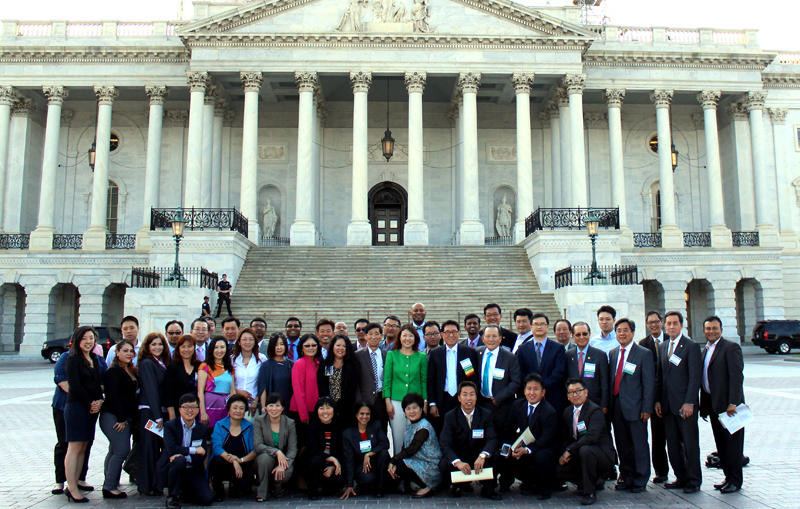

Over 100 AAPI faith leaders gathered at Washington, D.C. for the 8th Lighting the Community Summit.
The Asian American Pacific Islander (AAPI) faith community makes up a significant portion of America's population today, but it seems the community still has a distance to cover in terms of spreading awareness of its specific interests and needs to the public, having a strong voice in social issues that affect the nation, and being recognized for its contribution to the greater society.
Lighting the Community Summit, a conference that takes place at Washington, D.C. hosted by Korean Churches for Community Development (KCCD), is one of the spaces in which the AAPI faith community is given the opportunity and platform to voice their interests and concerns, and their opinions on current issues affecting the nation. AAPI faith leaders are also able to connect with each other and with those in the public and private sectors to work together in serving the community. The eighth annual LTC took place from Monday to Wednesday this week, with various activities including panels with leaders in the government, a prayer breakfast, and a White House briefing.
Notable leaders in the public sector who were present at the summit include Jannah Scott, the Deputy Director of the Center for Faith-Based and Neighborhood Partnerships in the U.S. Department of Homeland Security; Mark Brinkmoeller, the Director of the Office of Faith-Based and Community Initiatives of the U.S. Agency for International Development; Diana Yu, the Advisor of the White House Initiative on Asian American and Pacific Islanders (WHIAAPI); David Kim, the Associate Administrator of the U.S. Department of Transportation; and Grace Choi, the Policy Advisor for the Secretary's Office on Global Women Issues in the U.S. Department of State.
Throughout the conference, participants discussed pressing issues affecting the nation today, including race relations, as well as issues that particularly affect the AAPI community, such as immigration, and peace and security in the Asian peninsula.
Though direct quotes were prohibited from being used in media from the White House briefing, leaders in the public sector who participated in the White House briefing as well as other panels during the summit expressed the necessity of the AAPI community voicing their concerns and opinions. Some added that the very act of the AAPI faith community gathering in D.C. to share their perspectives makes a statement to the governing leaders.
Standing in Solidarity
Among the various issues that were discussed during the conference, the AAPI faith community expressed their own experiences of pain and frustration with systemic injustice, as well as their experiences with the riots that have ensued after the recent death of Freddie Gray.
Lovely Varughese, an Indian American woman, shared the story of her son's death, and the frustration she experienced while trying to fight for justice on behalf of her son, Pravin, who died in February of 2014. Pravin's body was found in the woods with multiple bruises and injuries, but the cororner listed his cause of death as hypothermia, and "the police suspected no foul play," Varughese said. Over a year later, Pravin's case is still open, and Varughese and Pravin's supporters are still advocating.
"It's hard sharing this painful story, but I know I need to keep fighting for this and sharing this story because I want to help prevent other families from experiencing this," Varughese said.
Priscilla Baek, a senior manager of public affairs for Mitsui & Co., shared the pain of the families who own small businesses in the midst of riots.
Baek's family owned a small beauty supply shop during the times of the 1992 L.A. Riots, and said that as a result, she felt compelled to speak about her experiences when the Baltimore riots broke out.
"We have to remember that we're in this together, and we need to work together to get out of the cycle of poverty," Baek said.
Mee Moua, the executive director of Asian Americans Advancing Justice, added that in such circumstances as these, the AAPI community standing in solidarity with other ethnic groups is crucial.
"As Asian Americans, we need to disrupt the social and racial order, and stand in solidarity with others by finding our commonalities," Moua said.
The issue of civil rights, and the federal My Brother's Keeper initiative were also discussed at the White House briefing.
The "Ministry of Presence"
As social issues were being discussed during the conference, one of running themes of the summit has been that of the "ministry of presence."
Mark Keam, one of the delegates of the Virginia House of Delegates in the 35th District, used the term when he spoke during the first night of the summit, saying that one of the rules to success is simply being present, and serving in whatever means in every situation.
This idea seemed to penetrate the small group discussions and panels throughout the conference. Many leaders agreed that members of the AAPI faith community have been making progress in civic engagement thus far, but to make even greater headway, the community must be present and involved.
"Many people tend to think that someone else is dealing with the social issues, so they don't feel the need to be engaged themselves," Diana Yu said during a panel on Tuesday. "But there needs to be engagement with conviction even in civic issues. Mission is not only out there, but even within the government."
David S. Kim of the U.S. Dept. of Transportation said there would be a significant impact if the AAPI faith community held active commitment to civic engagement and public service just as much of a dominant and important part of life as the work, family, and church.
Mee Moua encouraged the AAPI faith community to host civic activities such as voter registration drives, and to show up for the Census 2020, because "when we're counted in the numbers, our voice will matter."


















